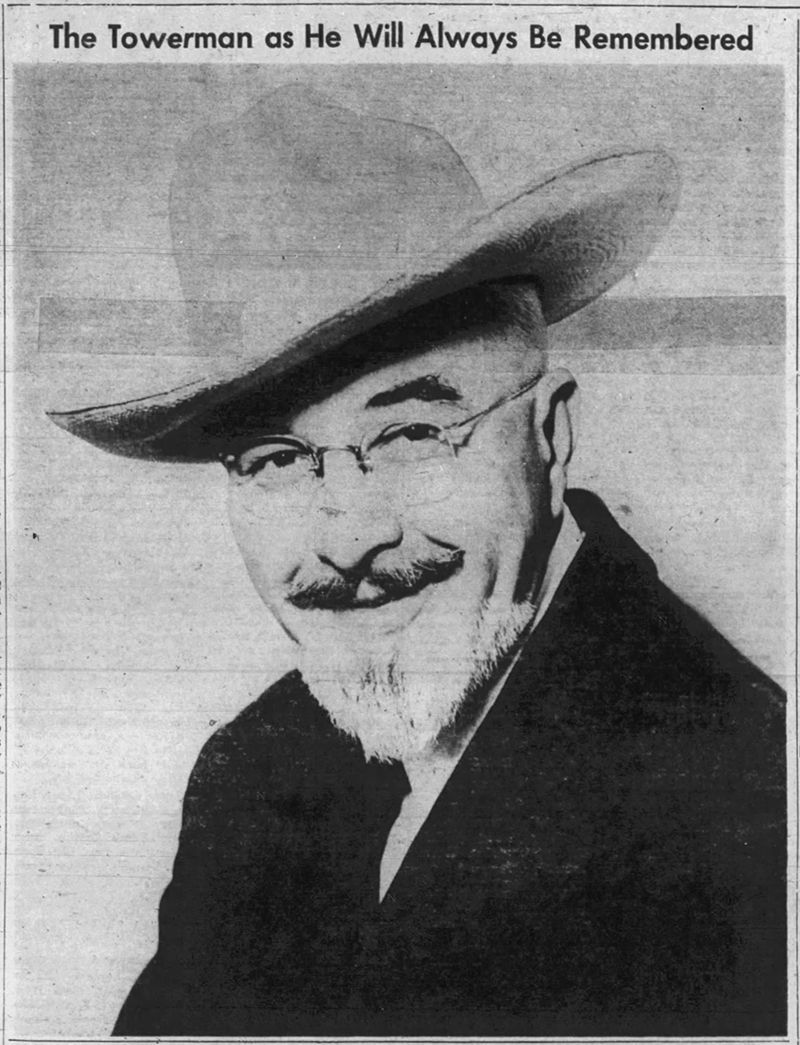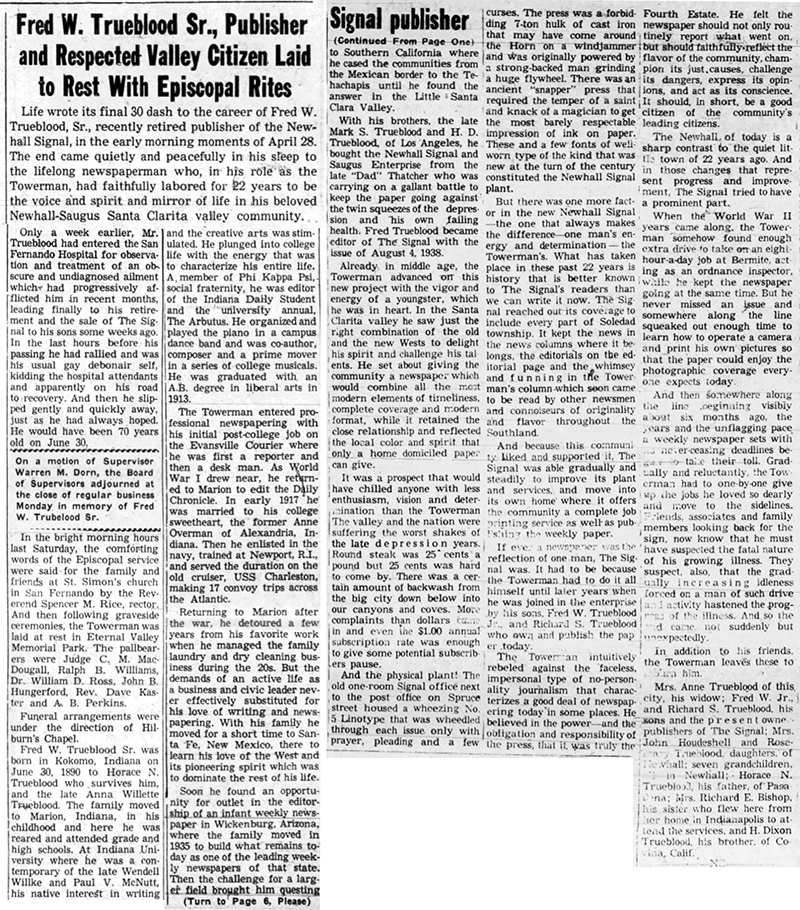
Click to enlarge.
|
Life wrote its final 30 dash to the career of Fred W. Trueblood Sr., recently retired publisher of the Newhall Signal, in the early morning moments of April 28. The end came quietly and peacefully in his sleep to the lifelong newspaperman who, in his role as the Towerman, had faithfully labored for 22 years to be the voice and spirit and mirror of life in his beloved Newhall-Saugus Santa Clarita valley community.
Only a week earlier, Mr. Trueblood had entered the San Fernando Hospital for observation and treatment of an obscure and undiagnosed ailment which had progressively afflicted him in recent months, leading finally to his retirement and the sale of The Signal to his sons some weeks ago. In the last hours before his passing he had rallied and was his usual gay debonair self, kidding the hospital attendants and apparently on his road to recovery. And then he slipped gently and quickly away, just as he had always hoped. He would have been 70 years old on June 30.
In the bright morning hours last Saturday, the comforting words of the Episcopal service were said for the family and friends at St. Simon's church in San Fernando by the Reverend Spencer M. Rice, rector. And then following graveside ceremonies, the Towerman was laid at rest in Eternal Valley Memorial Park. The pallbearers were Judge C.M. MacDougall, Ralph B. Williams, Dr William D. Ross, John B. Hungerford, Rev. Dave Raster and A.B. Perkins.
Funeral arrangements were under the direction of Hilburn's Chapel.
Fred W. Trueblood Sr. was born in Kokomo, Indiana, on June 30, 1890, to Horace N. Trueblood who survives him, and the late Anna Willette Trueblood. The family moved to Marion, Indiana, in his childhood and here he was reared and attended grade and high schools. At Indiana University where he was a contemporary of the late Wendell Willkie and Paul V. McNutt, his native interest in writing and the creative arts was stimulated. He plunged into college life with the energy that was to characterize his entire life. A member of Phi Kappa Psi, social fraternity, he was editor of the Indiana Daily Student and the university annual, The Arbutus. He organized and played the piano in a campus dance band and was co-author, composer and a prime mover in a series of college musicals. He was graduated with an A.B. degree in liberal arts in 1913.
The Towerman entered professional newspapering with his initial post-college job on the Evansville Courier where he was first a reporter and then a desk man. As World War I drew near, he returned to Marion to edit the Daily Chronicle. In early 1917 he was married to his college sweetheart, the former Anne Overman of Alexandria, Indiana. Then he enlisted in the navy, trained at Newport, R.I., and served the duration on the old cruiser, USS Charleston, making 17 convoy trips across the Atlantic.
Returning to Marion after the war, he detoured a few years from his favorite work when he managed the family laundry and dry cleaning business during the '20s. But the demands of an active life as a business and civic leader never effectively substituted for his love of writing and newspapering. With his family he moved for a short time to Santa Fe, New Mexico, there to learn his love of the West and its pioneering spirit which was to dominate the rest of his life.
Soon he found an opportunity for outlet in the editorship of an infant weekly newspaper in Wickenburg, Arizona, where the family moved in 1935 to build what remains today as one of the leading weekly newspapers of that state. Then the challenge for a larger field brought him questing to Southern California where he cased the communities from the Mexican border to the Tehachapis until he found the answer in the Little Santa Clara Valley.
With his brothers, the late Mark S. Trueblood and H.D. Trueblood, of Los Angeles, he bought the Newhall Signal and Saugus Enterprise from the late "Dad" Thatcher who was carrying on a gallant battle to keep the paper going against the twin squeezes of the depression and his own failing health. Fred Trueblood became editor of The Signal with the issue of August 4, 1938. [Note: Thatcher didn't own the paper. He was hired as publisher and editor by Blanche Brown, who sold it to the Truebloods. — Ed.]
Already in middle age, the Towerman advanced on this new project with the vigor and energy of a youngster, which he was in heart. In the Santa Clarita valley he saw just the right combination of the old and the new Wests to delight his spirit and challenge his talents. He set about giving the community a newspaper which would combine all the most modern elements of timeliness, complete coverage and modern format, while it retained the close relationship and reflected the local color and spirit that only a home domiciled paper can give.
It was a prospect that would have chilled anyone with less enthusiasm, vision and determination than the Towerman. The valley and the nation were suffering the worst shakes of the late depression years. Round steak was 25 cents a pound, but 25 cents was hard to come by. There was a certain amount of backwash from the big city down below into our canyons and coves. More complaints than dollars came in and even the $1.00 annual subscription rate was enough to give some potential subscribers pause.
And the physical plant! The old one-room Signal office next to the post office on Spruce street housed a wheezing No. 5 Linotype that was wheedled through each issue only with prayer, pleading and a few curses. The press was a forbidding 7-ton hulk of cast iron that may have come around the Horn on a windjammer and was originally powered by a strong-backed man grinding a huge flywheel. There was an ancient "snapper" press that required the temper of a saint and knack of a magician to get the most barely respectable impression of ink on paper. These and a few fonts of well-worn type of the kind that was new at the turn of the century constituted the Newhall Signal plant.
But there was one more factor in the new Newhall Signal — the one that always makes the difference — one man's energy and determination — the Towerman's. What has taken place in these past 22 years is history that is better known to The Signal's readers than we can write it now. The Signal reached out its coverage to include every part of Soledad township. It kept the news in the news columns where it belongs, the editorials on the editorial page and the whimsey and funning in the Towerman's column which soon came to be read by other newsmen and connoisseurs of originality and flavor throughout the Southland.
And because this community liked and supported it, The Signal was able gradually and steadily to improve its plant and services, and move into its own home where it offers the community a complete job printing service as well as publishing the weekly paper.
If ever a newspaper was the reflection of one man, The Signal was. It had to be because the Towerman had to do it all himself until later years when he was joined in the enterprise by his sons, Fred W. Trueblood Jr. and Richard S. Trueblood, who own and publish the paper today.
The Towerman intuitively rebelled against the faceless, impersonal type of no-personality journalism that characterizes a good deal of newspapering today in some places. He believed in the power — and the obligation and responsibility of the press, that it was truly the Fourth Estate. He felt the newspaper should not only routinely report what went on, but should faithfully reflect the flavor of the community, champion its just causes, challenge its dangers, express its opinions, and act as its conscience. It should, in short, be a good citizen of the community's leading citizens.
The Newhall of today is a sharp contrast to the quiet little town of 22 years ago. And in those changes that represent progress and improvement, The Signal tried to have a prominent part.
When the World War II years came along, the Towerman somehow found enough extra drive to take on an eight-hour-a-day job at Bermite, acting as an ordnance inspector, while he kept the newspaper going at the same time. But he never missed an issue and somewhere along the line squeaked out enough time to learn how to operate a camera and print his own pictures so that the paper could enjoy the photographic coverage everyone expects today.
And then somewhere along the line beginning visibly about six months ago, the years and the unflagging pace a weekly newspaper sets with its never-ceasing deadlines began to take their toll. Gradually and reluctantly, the Towerman had to one by-one give up the jobs he loved so dearly and move to the sidelines. Friends, associates and family members looking back for the sign, now know that he must have suspected the fatal nature of his growing illness. They suspect, also, that the gradually increasing idleness forced on a man of such drive and activity hastened the progress of the illness. And so the end came not suddenly but unexpectedly.
In addition to his friends, the Towerman leaves these to mourn him.
Mrs. Anne Trueblood of this city, his widow; Fred W. Jr., and Richard S. Trueblood, his sons and the present owners and publishers of The Signal; Mrs. John Houdeshell and Rosemary Trueblood, daughters, of Newhall; seven grandchildren, all in Newhall; Horace N. Trueblood, his father, of Pasadena; Mrs. Richard E. Bishop, his sister who flew here from her home in Indianapolis to attend the services, and H. Dixon Trueblood, his brother, of Covina, Calif.
On a motion of Supervisor Warren M. Dorn, the Board of Supervisors adjourned at the close of regular business Monday in memory of Fred W. Trueblood Sr.

Click to enlarge.










